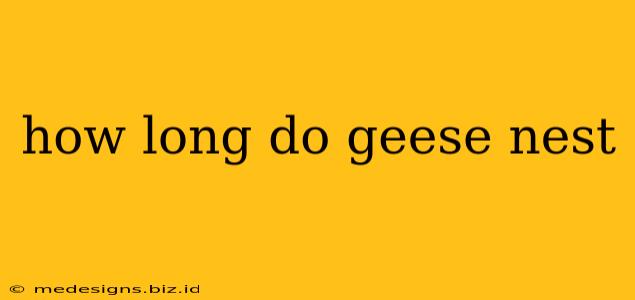Geese are fascinating birds known for their strong family bonds and impressive migration patterns. But how much do you know about their nesting habits? Understanding their nesting period is crucial for conservation efforts and for anyone simply curious about these magnificent creatures. So, how long do geese nest? Let's delve into the details.
The Goose Nesting Period: A Detailed Look
The length of time geese spend nesting varies slightly depending on the species and environmental factors. However, a general timeframe can be established. Typically, the entire nesting process, from nest building to fledgling departure, lasts around 6-8 weeks.
Stages of Goose Nesting:
This timeline can be broken down into several key stages:
-
Nest Building (1-2 weeks): The female goose, or gander, takes the lead in constructing the nest. This involves gathering materials like grasses, leaves, twigs, and down feathers to create a comfortable and protective space for her eggs. The location is carefully chosen, often near water, offering protection and access to food.
-
Egg Laying (1-2 weeks): Most geese lay one egg per day, resulting in a clutch size ranging from 4 to 6 eggs. The exact number varies depending on the species and the female's health. During this period, the female will rarely leave the nest except for brief foraging trips.
-
Incubation (28-30 days): Once the clutch is complete, the female begins incubating the eggs. This is a demanding process requiring constant warmth and protection. The male goose plays a crucial role during this time, guarding the nest and providing food for the female.
-
Hatching and Brooding (2-3 weeks): After approximately 28-30 days, the eggs begin to hatch. The goslings are precocial, meaning they are relatively well-developed at birth and can walk and swim shortly after hatching. The parents remain attentive, keeping the goslings warm and safe for several weeks.
-
Fledgling Stage (4-6 weeks): The goslings gradually become more independent, learning to forage and protect themselves. The parents continue to protect and guide them until they are fully capable of fending for themselves. This period can last anywhere from 4 to 6 weeks, depending on the species and environmental conditions.
Factors Affecting Nesting Duration:
Several factors can influence the overall length of the nesting period:
-
Species: Different goose species have slightly different nesting behaviors and timelines. Some species may have longer or shorter incubation periods than others.
-
Weather conditions: Harsh weather, such as prolonged cold snaps or heavy rainfall, can impact nest success and prolong the overall nesting period.
-
Predation: The risk of predation can influence nesting behavior. If a nest is disturbed or attacked, the female may abandon the eggs, leading to nest failure.
-
Food availability: Adequate food supply is essential for successful nesting. A shortage of food can weaken the female, leading to reduced egg production or unsuccessful hatching.
Conclusion: Understanding Goose Nesting is Key to Conservation
Understanding the intricacies of goose nesting behavior is vital for conservation efforts. By protecting nesting habitats and minimizing human disturbance, we can help ensure the survival of these magnificent birds. Observing geese during their nesting period allows us to appreciate their remarkable dedication to their offspring and their intricate social structures. Remember, responsible wildlife observation is essential to ensure both the safety of the birds and the integrity of their natural environment.
